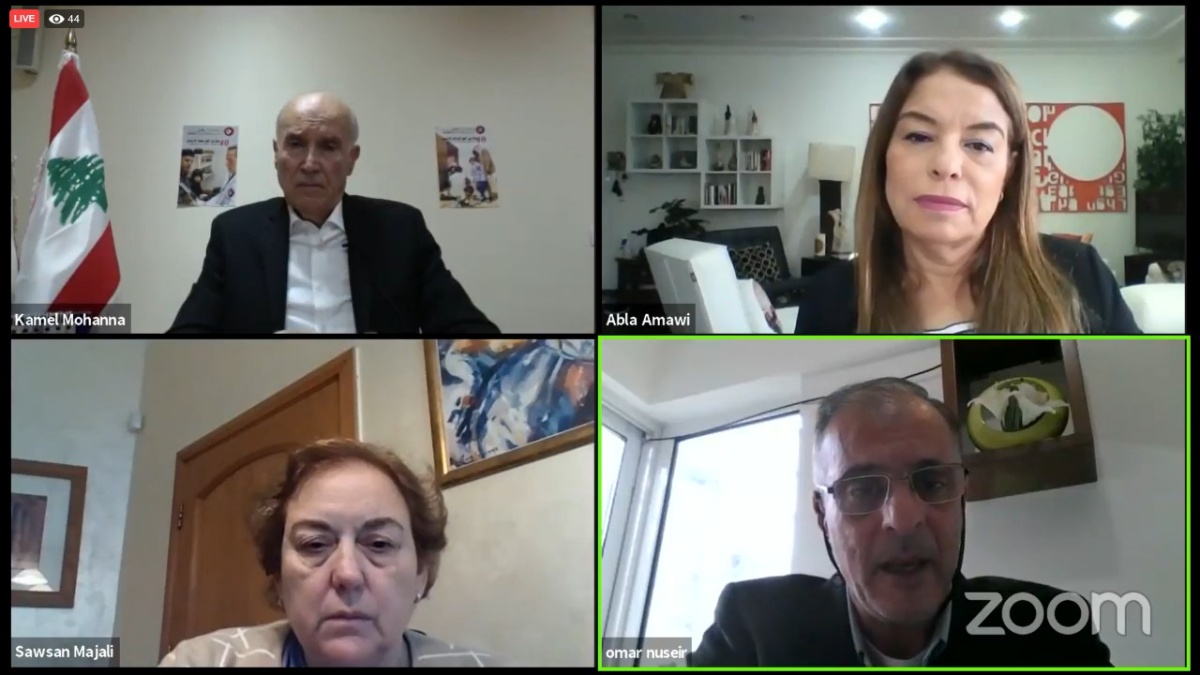Amman, Tuesday 5 May 2020 – The Arab Renaissance for Democracy and Development (ARDD) held the fourth virtual session of its regional dialogue series on social protection in the Arab world. Through this series, ARDD seeks to explore the viewpoints of Arab experts and decision makers on the multidimensional impact of the Coronavirus pandemic on poverty levels, social protection and the security of individuals and societies from a comprehensive perspective.
To initiate the session, HE Senator Dr. Sawsan Al-Majali, who cooperates with ARDD in moderating this series, welcomed the panelists: Dr. Abla Amawi, Secretary General of the Higher Population Council in Jordan and Chairman of the Arab Population and Development Council at the League of Arab States, and Dr. Kamel Muhanna, President of the Amel Association International and General Coordinator of the Lebanese and Arab Voluntary Civil Organizations, in Beirut, and HE Mr. Omar Naseer, Director of the Humanitarian Aid Department at the Ministry of Planning and International Cooperation in Jordan.
The speakers agreed that there is a set of challenges and various factors affecting analysis of the Arab region, such as internal conflicts and wars, armed conflicts, the Israeli occupation of Palestine, and the disparity between Arab countries in the capabilities of sustainable local development. This is in addition to threats related to lack of funding, the absence of sufficient roles and participation of the local community, lack of investment in scientific research, and the fragility and lack of coverage of protection systems in the Arab world.
Dr. Amawi referred to studies foreseeing the loss of more than $42 billion, which are projected to lead to the loss of 1.7 million jobs in the region, with more than 8 million people joining the “poor” in the Arab world. She emphasized the painful impact on vulnerable groups, which include more than 20 million refugees and displaced persons, in addition to the elderly, people with disabilities, refugees and prisoners. She highlighted women in specific as the most affected by the crisis, as 84 million of them work in the informal sector, and many are expected to suffer from the increase in violence against women during the current lockdowns, as well as the increase in unemployment rates by more than three times compared to men.
With regard to protection systems in Jordan, Amawi has discussed the fragility and weak emergency plans that do not cover the most affected groups in Jordan, such as: refugees who comprise 13.3% of the population with more than 86% of Syrians below the poverty line, and migrant workers which amount to 900,000 people, people with disabilities who constitute 11.1% of the population, and women led households which constitute 14.4% of the total families, and 900 thousand Jordanian workers, with 550 thousand of them work in informal sector. She added that it is important to note that 15.7% of the Jordanian population suffer from poverty, 4.1% of the population is elderly, and many people ages 15-60 in Jordan suffer from chronic illnesses. Amawi stressed the importance of including all these groups under the umbrella of social protection that is provided by the State and stressed the necessity of ensuring a complementary role of civil society in order to reach these groups.
Mr. Omar Nuseir stated that one third of the Jordanian population are non-Jordanians, and that a funding crisis in terms of refugees began prior to the spread of the Coronavirus, and that this has affected assistance provision, health and educational services for refugees and Jordanian host communities. Nuseir stressed the effectiveness of the Jordanian government’s role and that “the crisis constitutes an opportunity to restore confidence between the government and the citizens, if it manages to end the crisis and deal with the economic and health file.” He stressed the importance of the participation and support of civil society organizations in addressing the consequences of the crisis, warning that the repercussions of this pandemic have affected the whole world, especially in economic and financial terms.
Dr. Kamel Muhanna noted that “the world is heading towards less globalization, less welfare measures, more interest in social protection, and a need for comprehensive and not partial policies.” He pointed out that the crisis has highlighted the absence of comprehensive protection policies in most Arab countries and the necessity of ensuring a fair distribution of wealth, and called for social justice on a state level through which the private sector does not monopolize social protection services. From a global affairs point of reflection, he stressed that “the West is a partner in the Arab world, not a guardian, and that social change is coming, and there must be a solution to the Palestinian cause and to the elimination of terrorism.”
The speakers unanimously agreed that although the crisis appears to be a health crisis, it in fact has a political, environmental, social, economic and military background, and that all these components must be taken into account when creating plans to manage disasters and crises, and to respond to their consequences. They affirmed that this period represents an opportunity to reconsider the different roles of civil society, devote more efforts to the values of humanitarian service, strengthen civil and human dignity, and solidify solidarity rather than charity in the work of civil society organizations. The speakers also echoed the importance of coordination and enhancement of efforts, investing in community collaboration, restoring confidence between states and their citizens, and activating their role in establishing comprehensive social protection systems.
Finally, the speakers emphasized the centrality of the human being, which is the goal and end, and the importance of protecting and guaranteeing human rights for all, especially for the most vulnerable communities.


